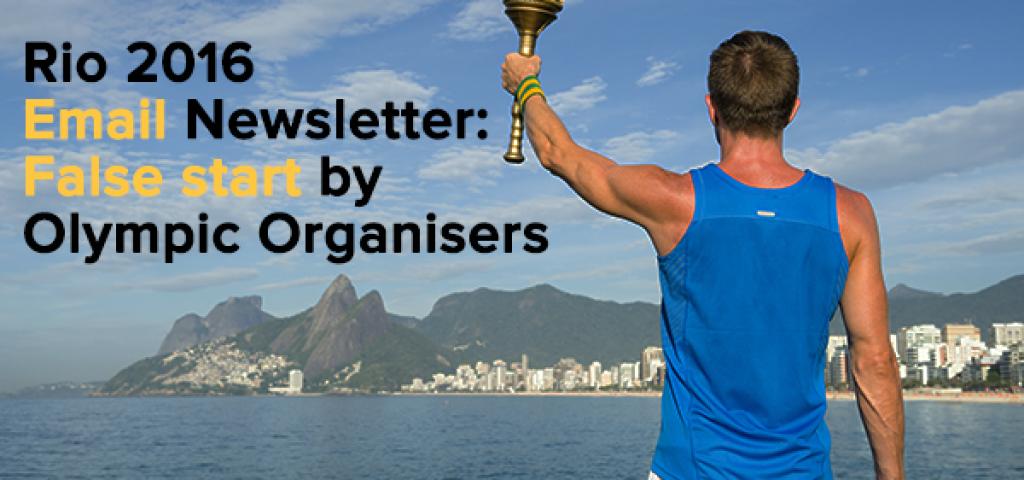We know what you're thinking.
An Olympics article now? Didn't the event finish last week?
Yes, it did. But let us explain. We wanted to write a piece about the Rio Olympics email marketing campaign, analysing the best and worst bits of the promised daily newsletter. We signed up and waited... and waited... and waited. And in three weeks, we’ve had just two emails. One thanking us for signing up; one telling us the games are over.
So far, so disappointing. Why did the Olympic organisers fail to deliver their newsletter, and what benefits did they miss in doing so?
The Mobile Olympics
London 2012 was heralded as the social media Olympics, generating 150 million tweets over 16 days. Aiming to break all records, Adriana Garcia, Director of Digital Communications at the Rio 2016 organising committee, expected around “80 per cent of our audience to come from mobile devices”, dubbing Rio the “mobile device games”.
Garcia had good reason to feel confident, given the massive leaps made by social since London 2012. Video now dominates our newsfeeds with over 4bn videos being watched on Facebook every day. Mobile search surpassed desktop search in 2014 and continues to grow. Snapchat has ‘grown up’, becoming the most popular mobile social app by new users daily. Meanwhile, live streaming is now possible in a growing number of networks via the likes of Facebook Live and Periscope for Twitter.
Over the past weeks, these new patterns in social have allowed users to interact with athletes directly via Snapchat and Instagram and consume content through video on Facebook and Twitter.
Aiming to capitalise on this social shift could explain why the Rio 2016 committee have failed to focus on their wider marketing activities, including their email newsletter. What are they missing having done so?
Newsletter benefits
While email newsletters have been around since before the internet could walk, the last three years has seen a definitive renaissance in such activity, and not only with established businesses. Interested audiences pining for order amongst the chaos of social media are once more digesting news in a familiar and finite location: their email inbox.
By neglecting the newsletter, the Olympic organisers have shunned some of their most dedicated followers. Although likely to break engagement records on social, the committee have missed a valuable opportunity to connect with their “opted-in” audience. What could they have done better?
An alternate Olympic email strategy
Exclusive Content
Instead of a flood of videos, tweets and news stories from all corners of the web, newsletters provide a focal point for high-quality journalistic content. Businesses can curate exclusive content directly for email inboxes, making sure customers never miss highlights worth paying attention to. What if the Rio organisers had delivered exclusive interviews with athletes?
Video and Photography
Embedding videos and images in a newsletter is an easy way to liven up a newsletter and to drive traffic to a website. Film, for one, has become essential across most digital marketing formats. Newsletters are no exception. With 28 sports to choose from, the Rio committee had plenty of opportunities to capture and share moments of victory and humanity in the field.
Surveys and Questionnaires
The familiarity of opted-in newsletters increases the chances of readers completing a short survey or questionnaire. These results can then be used to improve a particular service, or be transformed into an infographic. Insight gleaned from their email subscribers could have been used by the Olympics committee to improve the upcoming Paralympics event.
Why does email still matter?
Data collection
Email marketing generates rich data, which can be used to amend and improve future marketing campaigns. Coupled with social media activity, it’s possible to build up a detailed profile of target customers and followers.
Relationship management
Because customers have opted to allow access to their inbox, they are more likely to read a newsletter than a tweet. Better still, the nature of their interaction means they’re likely to more closely associate your messaging with your brand - boosting engagement further.
Be Genuine
A newsletter does not have to conform to the ‘shareability’ guidelines of social media. As such, the most successful newsletters are often the most intimate – providing a sincerity that rarely breaches the damning world of social networks.
Let’s hope the Rio committee boost their email efforts for the Paralympics, which kick off on the 7th. Gold medal-winning engagement, reach and data could be theirs after all.
If you're struggling to keep up with your newsletter demands, Winbox can design, write and deliver yours directly to your customer. To find out more, get in touch with Marc today.
digital marketing
Email Marketing
rio





